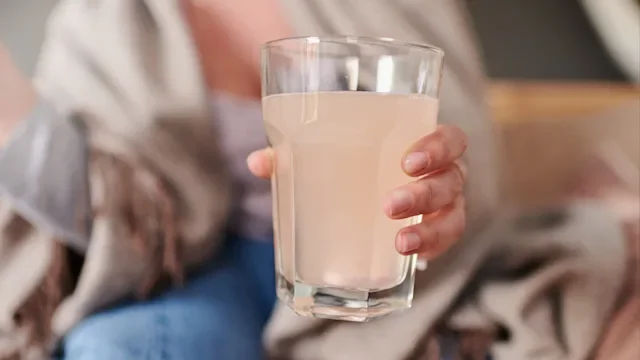Key takeaways:
Kava is an herbal remedy that people take to help with stress and anxiety.
The research shows mixed findings on the benefits and risks of kava.
Most people can safely take kava in limited amounts. But there’s a small risk of potentially serious side effects, including liver problems.
For thousands of years, people have used herbs and plants to treat illness and support health. Kava is one such remedy that’s been around for a long time — and has recently grown in popularity. People have been turning to kava to ease anxiety and stress, among other uses. But what exactly is kava, and does research support its health benefit claims?
What is kava?
Kava — also called kava kava — is a drink or extract made from the kava root plant, Piper methysticum. The plant is a member of the pepper family and grows on the Pacific Islands. Indigenous people of these islands have used kava for centuries. In local languages, the word “kava” refers to the drink’s bitter taste.
What is kava used for?
People sometimes take kava for anxiety. In fact, anxiety and stress relief are among the most common reasons that people take it.
Other traditional uses of kava include:
Pain relief
Relaxation
Sacred ritual purposes
Search and compare options
Scientists are also studying kava’s effects and its potential uses in treating inflammation, brain-related conditions, and cancer. But these are new areas of research.
What is in kava, and what does it do?
The active substances in kava are called kavapyrones, or kavalactones. If you’re wondering what kavalactones are, you aren’t alone. Scientists don’t fully understand how these substances work. But these active substances may affect how nerves send messages throughout the body and the brain.
For example, scientists know that kava affects GABA (gamma aminobutyric acid) nerve receptors. Alcohol and certain medications for anxiety and pain also work on these receptors. For some people, taking kava results in a feeling of calm or helps with pain relief. So, this may point to how kava works, but more research is needed.
What are the effects of kava?
The effects of kava can depend on your body size, how much you take, and what other medicines you’re taking. Overall, kava effects are somewhat similar to those of alcohol. Kava can make you feel more relaxed and sleepy. You might feel a greater sense of well-being. Because kava relaxes muscles, you might have a slower response time. Some researchers feel this warrants more research to see if driving while using kava might lead to motor vehicle accidents.
Kava benefits
The research on kava’s benefits is limited. Here, we’ll break down what the science says about possible benefits of kava.
Kava and anxiety
There’s evidence that kava may be an effective natural remedy for anxiety, when it’s used for a few weeks. Kava may help with short-term stress and worry, especially if a particular situation is the root cause. Kava may also help with symptoms of anxiety during menopause.
Natural remedies for anxiety: Get a breakdown of what the science says about herbal remedies and supplements for anxiety.
Supplements for sleep: If you’re considering a sleep supplement, kava isn’t your only choice. Learn about other pharmacist-backed options, like magnesium and melatonin.
Tips for choosing supplements safely: Over-the-counter (OTC) supplements aren’t regulated by the FDA. Here’s what you need to know before you buy.
But, when it comes to long-term use, the data is less clear. Some studies evaluated the use of kava for 4 months and found that kava may not help generalized anxiety. Keep in mind that there’s no data on the safety of using kava as a long-term treatment for anxiety.
Kava and sleep
Some research suggests that kava might also help with sleep. In one study, participants took 200 mg of kava daily. After 4 weeks, those who took kava reported better quality of sleep. Kava may also be helpful for stress-induced insomnia. But more research is needed to know for sure if it helps.
Kava and post-traumatic stress disorder (PTSD)
It’s possible that kava may be helpful with treating post-traumatic stress disorder (PTSD). But there isn’t a lot of research on kava and PTSD. Researchers are in the early stage of investigating kava as a tool for therapy.
Read more like this
Explore these related articles, suggested for readers like you.
Kava and pain
Traditionally, kava has been used as a pain reliever. Some animal studies suggest that kavalactones can decrease some types of pain. But there isn’t evidence to show that it works to lower pain in people.
Kava side effects
Many people assume that herbal remedies, like kava, are free of side effects because they come from nature. But that’s not always the case.
Here are some of kava’s possible side effects:
Headache
Dizziness
Sleepiness
Feeling down or depressed
Diarrhea
Numbness in the mouth, throat, or tongue
Liver damage
Kava interactions
Although serious side effects are uncommon when taking kava alone, it can interact with certain medications and substances.
Talk with a healthcare professional or pharmacist before taking kava with:
Alcohol
Medications that cause drowsiness, like sedatives
Medications that affect the liver, like acetaminophen (Tylenol)
Anxiety medications, like benzodiazepines
Medications used to treat Parkinson’s disease
Medications that are similar to dopamine, as well as those that block dopamine, like haloperidol (Haldol)
Monoamine oxidase inhibitors (MAOIs)
The potential risks of these interactions include liver damage and coma. And, keep in mind, this isn’t a complete list of substances that kava might interact with.
Kava drinks and supplements
Traditionally, kava is consumed as an herbal tea. Kava drinks are made by grinding up kava roots into a powder, which is then stirred into water or coconut milk.
Apart from the drinkable forms (like kava tea), kava supplements are also available as:
Powders
Extracts
Tablets
Capsules
There isn’t much research comparing different forms of kava supplements. Most studies have used kava extracts, and there aren’t any official dosing guidelines. Typical doses range from about 70 mg to 280 mg per day, but it’s best to check with a trusted healthcare professional before starting.
Is kava safe?
Some research studies have found that kava is safe in doses of less than 400 mg a day. But the FDA doesn’t classify kava as a “generally recognized as safe” supplement. That’s because kava has been linked to cases of severe liver injury — including liver failure. In one case, a liver transplant was needed.
In fact, in some countries — including Canada and the U.K. — kava is banned due to concerns about liver toxicity. The FDA hasn’t banned kava, but it did issue a consumer advisory in 2002 cautioning healthcare professionals and consumers about the risk of liver damage.
Kava and liver damage
In recent studies, the risk of liver damage related to kava appears to be small but real. Liver damage from kava may be mild or severe. In most cases, the damage is reversible and improves after a couple of months of not taking kava.
More recent studies suggest that the risk of liver damage is higher with:
Doses of kava that are too high
Poor-quality kava
Kava in combination with alcohol and medications that affect the liver
Long-term use of kava
What happens if you take too much kava?
If you take too much kava at once, you may experience:
Weak or uncoordinated muscles
Nausea
A slight fever
Dilated (large) pupils
Red eyes
Feeling very sleepy
People who take a lot of kava over longer periods of time may experience:
Mood changes
Weight loss
Dry and scaly skin
Shortness of breath
A loss of interest in relationships and activities
More frequent infections
Liver problems
If you’re worried that you’re having an abnormal reaction to kava, call Poison Control at 1-800-222-1222. For serious symptoms, call 911 or go to the nearest emergency room.
Who should not take kava?
For most adults, limited amounts of kava are likely safe. But kava may be riskier for some people.
Avoid kava if:
You have liver disease.
You’ll be driving or operating heavy machinery.
You’re also drinking alcohol or taking medications that cause sedation.
You’re pregnant or breastfeeding.
You’ll be having surgery or a procedure involving anesthesia.
Talk with a healthcare professional if you have questions about or are considering taking kava. Be sure to provide them with a full list of your medications and supplements, so they can help you weigh the benefits and risks of taking kava.
Frequently asked questions
Kava has an earthy, somewhat bitter taste — a little like peppery tea. Some people describe it as slightly spicy or even compare it to muddy water because of its thick texture.
Unlike alcohol or certain medications, kava doesn’t seem to be physically addictive. But it can still become habit-forming. You might start to rely on it to relax or unwind, which can lead to psychological dependence over time.
You can begin to feel the effects of kava within 20 to 40 minutes. The effects usually last for up to 9 hours, although kava can remain in the body for 1 to 2 days after just one dose.
Kava has an earthy, somewhat bitter taste — a little like peppery tea. Some people describe it as slightly spicy or even compare it to muddy water because of its thick texture.
Unlike alcohol or certain medications, kava doesn’t seem to be physically addictive. But it can still become habit-forming. You might start to rely on it to relax or unwind, which can lead to psychological dependence over time.
You can begin to feel the effects of kava within 20 to 40 minutes. The effects usually last for up to 9 hours, although kava can remain in the body for 1 to 2 days after just one dose.
The bottom line
People have used kava (also called kava kava) as an herbal supplement and traditional remedy for a long time. Some research suggests that it may have relaxing or stress-relieving effects. It may be a helpful treatment for anxiety. But kava has a rare, but serious, risk of causing liver damage. Like any medication, supplement, or treatment, it’s not right for everyone. It’s best to talk with a healthcare professional about kava, especially if you take medication or have certain health conditions.

Why trust our experts?



References
Alcohol and Drug Foundation. (2025). Kava.
Aporosa, S. A., et al. (2025). Innovating through tradition: Kava-talanoa as a culturally aligned medico-behavioral therapeutic approach to amelioration of PTSD symptoms. Frontiers in Psychology.
Asher, G. N., et al. (2017). Common herbal dietary supplement – Drug interactions. American Family Physician.
Better Health Channel. (2022). Kava. Victoria State Government.
Bian, T., et al. (2020). Kava as a clinical nutrient: Promises and challenges. Nutrients.
Davies, M. (2003). The role of GABAA receptors in mediating the effects of alcohol in the central nervous system. Journal of Psychiatry and Neuroscience.
Fu, P. P., et al. (2008). Toxicity of kava kava. Journal of Environmental Science and Health Part C, Environmental Carcinogenesis & Ecotoxicology Reviews.
Garakani, A., et al. (2020). Pharmacotherapy of anxiety disorders: Current and emerging treatment options. Frontiers in Psychiatry.
IARC Working Group on the Evaluation of Carcinogenic Risks to Humans. (2016). Some Drugs and Herbal Products. International Agency for Research on Cancer.
Lakhan, S. E., et al. (2010). Nutritional and herbal supplements for anxiety and anxiety-related disorders: Systematic review. Nutrition Journal.
Lee, R. (2007). Kava: Piper methysticum. Clinician.com.
Lehri, S., et al. (2004). Clinical efficacy of kava extract WS 1490 in sleep disturbances associated with anxiety disorders: Results of a multicenter, randomized, placebo-controlled, double-blind clinical trial. Journal of Affective Disorders.
LiverTox. (2018). Kava kava.
Montague, Z. (2017). Stressed New Yorkers take to kava, ‘nature’s Xanax’. The New York Times.
National Center for Complementary and Integrative Health. (2025). Kava. National Institutes of Health.
Office of Dietary Supplements. (n.d.). Kava. National Institutes of Health.
Pittler, M. H., et al. (2003). Kava extract versus placebo for treating anxiety. Cochrane Database of Systematic Reviews.
Raduege, K. M., et al. (2004). Anesthetic considerations of the herbal, kava. Journal of Clinical Anesthesia.
Sarris, J., et al. (2019). Kava for generalised anxiety disorder: A 16-week double-blind, randomised, placebo-controlled study. Australian and New Zealand Journal of Psychiatry.
Smith, K., et al. (2018). The effectiveness and safety of kava kava for treating anxiety symptoms: A systematic review and analysis of randomized clinical trials. Complementary Therapies in Clinical Practice.
Soares, R. B., et al. (2022). An updated review on the psychoactive, toxic, and anticancer properties of kava. Journal of Clinical Medicine.
The University of Waikato. (2023). Kava based therapy for psychological trauma reaches clinical trial milestone.
Tzeng, Y., et al. (2015). Neuroprotective properties of kavalactones. Neural Regeneration Research.
U.S. Food and Drug Administration. (2020). Memorandum: Review of the published literature pertaining to the safety of kava for use in conventional foods.
U.S. Food and Drug Administration. (2025). Post-market determinations that the use of a substance is not GRAS.
Wainiqolo, I., et al. (2015). Is driving under the influence of kava associated with motor vehicle crashes? A systematic review of the epidemiological literature. Australian and New Zealand Journal of Public Health.
Wheatley, D. (2001). Kava and valerian in the treatment of stress-induced insomnia. Phytotherapy Research.
Wittersheim, E. (2020). A ‘Pacific’ drug? Vanuatu’s kava and the American market. Living with Drugs.


















